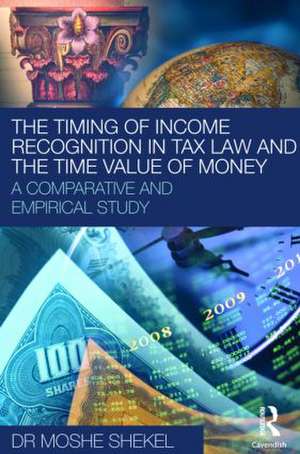The Timing of Income Recognition in Tax Law and the Time Value of Money
Autor Moshe Shekelen Limba Engleză Hardback – 28 mai 2009
The time component is a weapon in the confrontation between the opposing motivations of the taxpayers and the tax authorities. In any given fiscal year, taxpayers seek to present a minimal picture of their chargeable income, by "deferring" the recognition of income or "advancing" the recognition of expenses. As opposed to this, the tax authorities adopt the opposite strategy: maximizing taxable "profit" in any given year.
This book critically examines the various approaches that have been adopted in the tax systems in the UK, the US and Israel in relation to the timing of income recognition and expenses for tax purposes. It suggests an innovative tax model that identifies the advantages that arise to the taxpayer as a result of the differences between the timing of the recognition of income and expenses, and the timing of the receipt of the revenue or the payment of a liability, and taxes only that advantage.
| Toate formatele și edițiile | Preț | Express |
|---|---|---|
| Paperback (1) | 478.98 lei 6-8 săpt. | |
| Taylor & Francis – mai 2012 | 478.98 lei 6-8 săpt. | |
| Hardback (1) | 1068.18 lei 6-8 săpt. | |
| Taylor & Francis – 28 mai 2009 | 1068.18 lei 6-8 săpt. |
Preț: 1068.18 lei
Preț vechi: 1302.65 lei
-18% Nou
Puncte Express: 1602
Preț estimativ în valută:
204.45€ • 212.64$ • 171.33£
204.45€ • 212.64$ • 171.33£
Carte tipărită la comandă
Livrare economică 13-27 martie
Preluare comenzi: 021 569.72.76
Specificații
ISBN-13: 9780415477543
ISBN-10: 0415477549
Pagini: 368
Ilustrații: 3 line drawings
Dimensiuni: 156 x 234 x 21 mm
Greutate: 0.84 kg
Ediția:New.
Editura: Taylor & Francis
Colecția Routledge-Cavendish
Locul publicării:Oxford, United Kingdom
ISBN-10: 0415477549
Pagini: 368
Ilustrații: 3 line drawings
Dimensiuni: 156 x 234 x 21 mm
Greutate: 0.84 kg
Ediția:New.
Editura: Taylor & Francis
Colecția Routledge-Cavendish
Locul publicării:Oxford, United Kingdom
Public țintă
Postgraduate and UndergraduateCuprins
1. Introduction 2. Accounting Background 3. Tax Values 4. Between GAAP and Fiscal Accounting 5. Timing of Recognition of Income from Deposits 6. Timing of Recognition of Income from Advances 7. Timing of the Deduction of Future Expenses 8. Alternative Models
Recenzii
'Moshe Shekel has produced a prodigious piece of work on timing, the result of a major research project... Few American practitioners, even in down economic times, can afford the time to write a comprehensive, comparative study, systematically pulling together the doctrine and the controversies about doctrine in three sophisticated jurisdictions—the United States, the United Kingdom, and Israel. But that comprehensive, comparative work is exactly what Shekel has given us.' - Erik M. Jensen, Columbia Journal of Tax Law, Vol. 1:262, 2010
'Moshe Shekel has produced a prodigious piece of work on timing, the result of a major research project ... Few American practitioners, even in down economic times, can afford the time to write a comprehensive, comparative study, systematically pulling together the doctrine and the controversies about doctrine in three sophisticated jurisdictions – the United States, the United Kingdom, and Israel. But that comprehensive, comparative work is exactly what Shekel has given us.' – Erik M. Jensen, Columbia Journal of Tax Law, Vol. 1:262, 2010
"Overall, the book is a truly scholarly piece about the theory and practice of taxable income recognition. ... Thanks to Dr Shekel, the reader ends up attaining a better grasp of the corporate taxing environments in these countries." - Volkan Muslu, European Accounting Review, 2011
'Moshe Shekel has produced a prodigious piece of work on timing, the result of a major research project ... Few American practitioners, even in down economic times, can afford the time to write a comprehensive, comparative study, systematically pulling together the doctrine and the controversies about doctrine in three sophisticated jurisdictions – the United States, the United Kingdom, and Israel. But that comprehensive, comparative work is exactly what Shekel has given us.' – Erik M. Jensen, Columbia Journal of Tax Law, Vol. 1:262, 2010
"Overall, the book is a truly scholarly piece about the theory and practice of taxable income recognition. ... Thanks to Dr Shekel, the reader ends up attaining a better grasp of the corporate taxing environments in these countries." - Volkan Muslu, European Accounting Review, 2011
Descriere
This book critically examines the various approaches of tax systems in the U.K., the U.S., and Israel, in relation to the timing of the recognition of income and expense for tax purposes, and suggests an innovative new model of timing for tax purposes.














